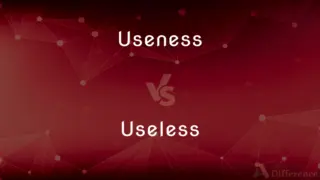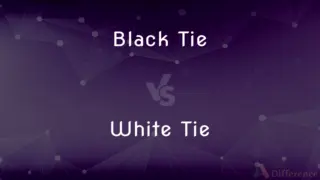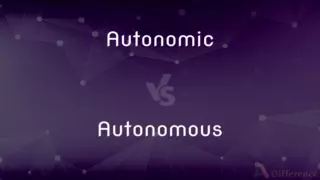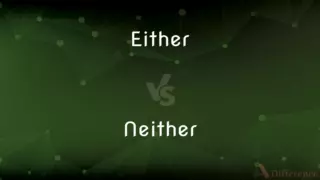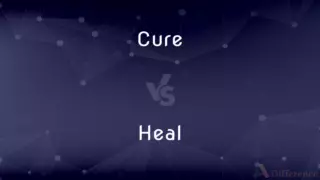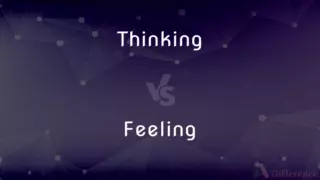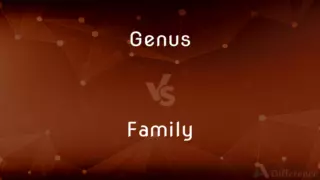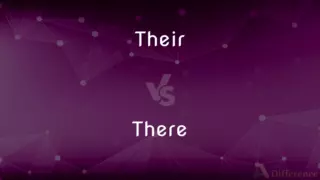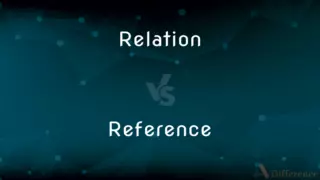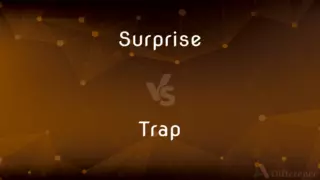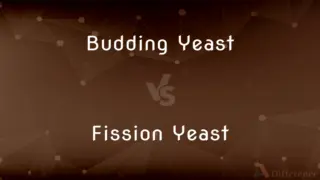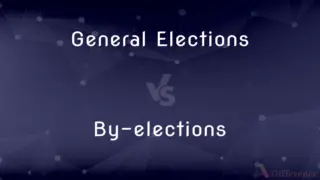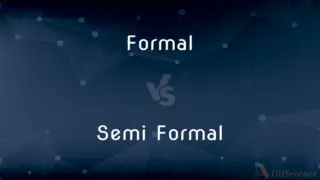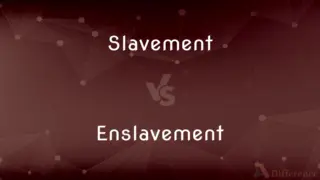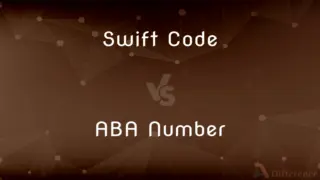Free Radical Substitution vs. Free Radical Addition — What's the Difference?
By Tayyaba Rehman — Published on October 20, 2023
Free Radical Substitution involves replacing an atom in a molecule with a radical. Free Radical Addition involves adding radicals to a molecule without removing atoms. Both are chain reactions initiated by radicals.
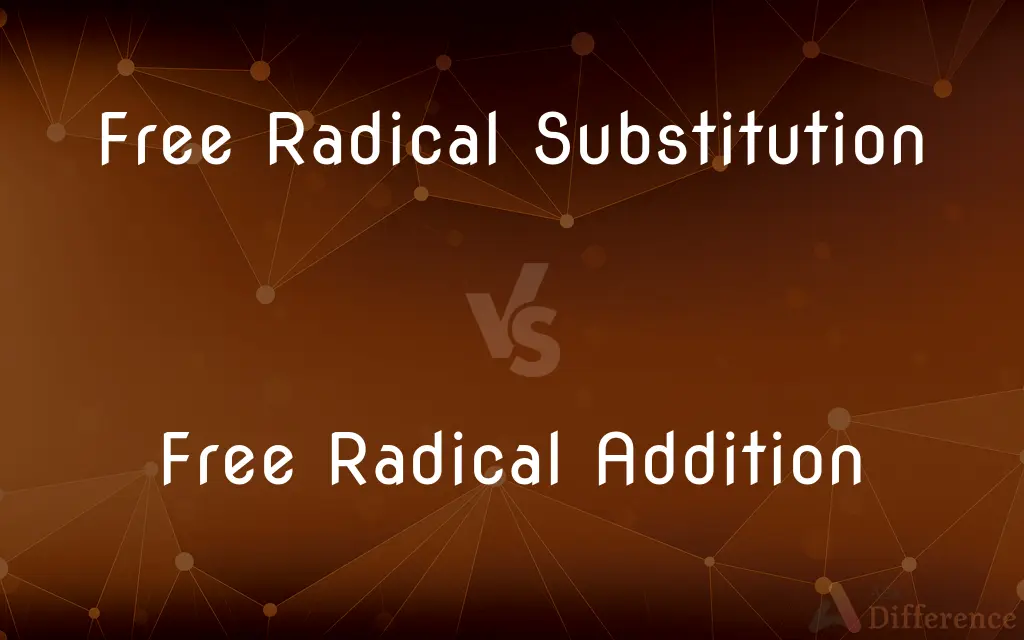
Difference Between Free Radical Substitution and Free Radical Addition
Table of Contents
ADVERTISEMENT
Key Differences
Applications and Occurrences: Free Radical Substitution reactions are common in halogenation reactions of hydrocarbons. In contrast, Free Radical Addition reactions are pivotal in the polymerization process of certain monomers. While both reactions can be harnessed for specific industrial purposes, their methods and outcomes are distinct.
Tayyaba Rehman
Oct 20, 2023
Reaction Initiation: Both Free Radical Substitution and Free Radical Addition reactions are initiated by radicals, often formed when a bond is broken by energy, such as heat or light. However, while both reactions involve radicals, their mechanisms and final products differ substantially.
Tayyaba Rehman
Oct 20, 2023
Mechanisms: The mechanisms of these two types of reactions involve multiple stages, including initiation, propagation, and termination. In both cases, the stability of the radical intermediates often dictates the course and the products of the reaction. However, the specific steps and intermediates for Free Radical Substitution differ from those in Free Radical Addition.
Tayyaba Rehman
Oct 20, 2023
Free Radical Substitution: This is a type of chemical reaction wherein a radical replaces a specific atom or group of atoms in a molecule. The process of Free Radical Substitution typically requires a halogen and a hydrocarbon. When these react under specific conditions, usually initiated by heat or light, a hydrogen atom from the hydrocarbon is replaced by the halogen. Free Radical Addition, on the other hand, doesn't involve this sort of replacement.
Tayyaba Rehman
Oct 20, 2023
Free Radical Addition: In contrast to Free Radical Substitution where an atom is replaced, Free Radical Addition involves radicals adding on to a molecule. Typically, this type of reaction is seen in the formation of polymers, where radicals play a crucial role in adding monomers together. Unlike Free Radical Substitution, no atoms are taken away in this process.
Tayyaba Rehman
Oct 20, 2023
ADVERTISEMENT
Comparison Chart
Reaction Type
Atom/group in a molecule is replaced by a radical.
Radicals add to a molecule without replacing any atom.
Tayyaba Rehman
Oct 20, 2023
Common Occurrences
Halogenation reactions of hydrocarbons.
Polymerization of monomers.
Tayyaba Rehman
Oct 20, 2023
Initiation
Often by heat or light, breaking a bond to form radicals.
Typically by breaking a bond using energy, forming radicals.
Tayyaba Rehman
Oct 20, 2023
Mechanisms
Involves initiation, propagation, and termination stages.
Follows initiation, propagation, and termination stages.
Tayyaba Rehman
Oct 20, 2023
ADVERTISEMENT
Definitions
Free Radical Substitution
A reaction where radicals replace atoms/groups in molecules.
In the presence of chlorine and ultraviolet light, methane undergoes Free Radical Substitution to produce chloromethane.
Tayyaba Rehman
Oct 06, 2023
Free Radical Addition
Often initiated by breaking a bond using energy.
Breaking the double bond in ethene through Free Radical Addition yields a larger molecule.
Tayyaba Rehman
Oct 06, 2023
Free Radical Substitution
A halogenation process initiated by radicals.
The Free Radical Substitution of propane with bromine results in 1-bromopropane.
Tayyaba Rehman
Oct 06, 2023
Free Radical Addition
A process where radicals add to molecules without removal.
Ethene, under specific conditions, can undergo Free Radical Addition to form a polymer.
Tayyaba Rehman
Oct 06, 2023
Free Radical Substitution
Initiated by energy sources like heat or light.
When exposed to sunlight, alkanes and chlorine undergo Free Radical Substitution.
Tayyaba Rehman
Oct 06, 2023
Free Radical Addition
Leads to products with added molecular segments.
Through Free Radical Addition, the original molecule gains extra segments, often increasing in size.
Tayyaba Rehman
Oct 06, 2023
Free Radical Substitution
A transformation yielding halogenated hydrocarbons.
One can produce a variety of halogenated compounds using Free Radical Substitution.
Tayyaba Rehman
Oct 06, 2023
Free Radical Addition
Vital in polymerizing certain monomers.
The polymerization of styrene via Free Radical Addition results in polystyrene.
Tayyaba Rehman
Oct 06, 2023
Free Radical Substitution
A chain reaction involving radical intermediates.
During Free Radical Substitution, various intermediates form before reaching the final halogenated product.
Tayyaba Rehman
Oct 06, 2023
Free Radical Addition
A chain reaction using radical intermediates.
The Free Radical Addition mechanism involves several steps before reaching the polymer product.
Tayyaba Rehman
Oct 06, 2023
FAQs
What is the main difference between Free Radical Substitution and Free Radical Addition?
Free Radical Substitution replaces an atom/group in a molecule, while Free Radical Addition adds to a molecule without removal.
Tayyaba Rehman
Oct 20, 2023
Which reaction leads to halogenated hydrocarbons?
Free Radical Substitution.
Tayyaba Rehman
Oct 20, 2023
Are both reactions initiated by radicals?
Yes, both are often initiated by radicals formed by energy sources like heat or light.
Tayyaba Rehman
Oct 20, 2023
What is a primary application of Free Radical Addition?
It's crucial in the polymerization of certain monomers.
Tayyaba Rehman
Oct 20, 2023
What role do radicals play in these reactions?
Radicals initiate and propagate the reactions, driving them forward.
Tayyaba Rehman
Oct 20, 2023
Where is Free Radical Substitution commonly observed?
It's common in halogenation reactions of hydrocarbons.
Tayyaba Rehman
Oct 20, 2023
Which reaction is more versatile in terms of end products?
Free Radical Addition, as it can lead to a wide range of added molecules or polymers.
Tayyaba Rehman
Oct 20, 2023
Are intermediates formed in both reaction types?
Yes, radical intermediates play a role in both reactions.
Tayyaba Rehman
Oct 20, 2023
Are both reactions chain reactions?
Yes, they both involve initiation, propagation, and termination stages.
Tayyaba Rehman
Oct 20, 2023
Which reaction is more sensitive to external conditions?
Both are sensitive, but Free Radical Substitution often requires more specific conditions for desired products.
Tayyaba Rehman
Oct 20, 2023
Can both reactions be initiated using ultraviolet light?
Yes, UV light can initiate both types of reactions, depending on the reactants.
Tayyaba Rehman
Oct 20, 2023
Is Free Radical Substitution specific to hydrocarbons?
While commonly seen with hydrocarbons, it can occur with other molecules under specific conditions.
Tayyaba Rehman
Oct 20, 2023
Can both reactions be controlled to produce specific products?
To an extent, but conditions and reactants must be carefully managed.
Tayyaba Rehman
Oct 20, 2023
Are there potential side reactions in these processes?
Yes, side reactions can occur, especially if conditions aren't carefully controlled.
Tayyaba Rehman
Oct 20, 2023
Author Spotlight

Written by
Tayyaba RehmanTayyaba Rehman is a distinguished writer, currently serving as a primary contributor to askdifference.com. As a researcher in semantics and etymology, Tayyaba's passion for the complexity of languages and their distinctions has found a perfect home on the platform. Tayyaba delves into the intricacies of language, distinguishing between commonly confused words and phrases, thereby providing clarity for readers worldwide.


